Page 1 2
Go  | New  | Find  | Notify  | Tools  | Reply  |  |
| Staring back from the abyss |
As a new owner/user, I'm having a hell of a time figuring this thing out. I've been a KitchenAid user for years and been very happy with it. Toss everything in, put on the hook, set it on 2, and come back in 8 minutes to some nice dough. No real complaints with the KA, but I've been wanting to take my bread baking up a notch and have read nothing but rave reviews on the Ank unit. So, I splurged, and I'm not convinced that I made the right decision...yet. My issue is that I'm not sure what the dough is supposed to look like as it's kneading. There are various Youtube videos of people "doing it right", but they're all different. The supposedly official video shows things very well, and the lady explains things well. She states that you add the flour until the dough just begins to release from the side of the bowl. Then, adjust the roller just to the point where it doesn't bounce (much), set your speed at about 3:00, you get a nice doughnut shaped dough rolling around, and knead for 8-10ish minutes. Done! Except it isn't. When I do that, I get a wet sticky mess when it's done. So, I've taken to slowly adding flour a teaspoon at a time to decrease the hydration. When I do that, I get to a point where I go from wet sticky mess to a consolidated ball of dough that whips around the bowl and roller with just one additional teaspoon of flour. Then, not only does it take 20+ minutes for it to knead to a window-pane, the machine walks all over the counter due to the centrifugal force of the ball of dough, and the base (motor) seemed to be getting too warm. Admittedly, it made some wonderful bread and the dough was tacky but not sticky, but I have to think that I'm doing something wrong here. Can anyone help me out? ________________________________________________________ "Great danger lies in the notion that we can reason with evil." Doug Patton. | ||
|
goodheart |
Gustofer, we’ve had an Ankersrum for maybe two years. Before that we used a Bosch Universal Mixer off and on for >30 years. I bake the bread for the family. I’m going to describe my process, since the recipe may differ from yours. First, I basically only bake whole wheat bread from flour I’ve milled from hard red winter wheat berries. Second, I used the roller and splitter, not the dough hook. The recipe/process is as follows: 1. 3 cups of cold water in the Ankersrum bowl 2. Add 2 cups just-boiled water, because that gives the total 5 cups the right working temperature of about 110-115 degrees; the yeast seems to do better at that temp. 3. Add 1/2 cup oil (I’m using olive now as avoiding “seed oils”). 4. Add 1 cup honey (sugar is fine, or half and half); I add the honey to the same cup I used to our the oil, so the honey doesn’t stick to the cup. 5. Add Vitamin C dough conditioner, maybe 1/2 tsp 6. Add 1 tbsp salt 7. Turn on mixer 8. Add 6 cups of whole wheat flour. I’ve taken to doing this to get the other ingredients mixed prior to adding yeast, as salt can deactivate yeast 9. Add 2 1/2 tbsp active dry yeast (I use Red Star); kept in freezer between batches. 10. Now finish adding the rest of the flour; the total is 14 cups for a batch, so slowly add 8 more cups 11. Check the dough for consistency: if too sticky, add a little more flour 12. The dough should “clean the bowl”—but this instruction doesn’t work as well for the Ankersrum as for the old Bosch with the dough hook. You can check for windowpaning; now that I have a routine amount worked out I don’t bother to check. 13. Set timer for 8 minutes, knead until the machine goes off. 14. While kneading, smear some oil on the inside of six small baking loaves (Chicago Metallic, from Amazon) 15. Set on counter digital scale, large plastic cutting board 16. Get one egg, separate white into a bowl; add maybe a tbsp of water, mix 17. Turn oven on warming cycle (170 degrees) 18. When kneading stops, remove boule from bowl (;-)), spread dough onto cutting board 19. Cut dough into 6 sections, about 1 lb 4 oz each, fold so it looks like a little embryo, pinch bottom together and put into pan, using fingers to fill corners of pan. 20. Take egg white/water mix, brush on top of loaves in pans 21. Sprinkle white, untoasted sesame seeds on top of loaves 22. Put loaves in oven; I then use a Thermoworks Chef Alarm with a probe that goes into one of the loaves, with alarm set for 200 degrees F. 23. Let loaves rise (single rise works fine) until loaves double in size 24. Optional: add pan of warm or hot water to bottom of oven during rise 25. Turn oven on to 350 and bake until probe alarm reaches 200 F. The Ankersrum, using this amount of dough, never feels like it’s working hard; never moves around the counter; the motor never gets overheated. I was thinking of posting this some time, but didn’t know if anyone was interested. It’s true the Ankersrum has a bit of a learning curve compared with the old Bosch (which we have rehabbed and still use in a rental house). But we—I—really like it. It will probably run fine until it’s passed on to our heirs. As I said, now that I have a routine process, I don’t normally stop the mixer to check for consistency of the dough. Sometimes I add a little flour to the dough at the end if it’s still sticky and let it knead for a couple of minutes more. I don’t like to let it get really thick. One last thing: we recently bought a new mill, a Wondermill from Pleasant Hill Grains. It’s better than our old Blendtec Kitchen Mill: quieter, much much less flour dust; you just fill the bowl and start the machine; but it takes more than one batch to make enough flour for a batch IIRC. Takes 10 cups of wheat berries to make 14 cups of flour. _________________________ “Remember, remember the fifth of November!" | |||
|
| Staring back from the abyss |
I do have a different recipe but it's still 100% whole wheat that I've been using (hard white). What I've done is add all of the liquids first with the salt, then roughly half of the flour, then yeast, then mix in the rest of the flour. Bulk ferment, then divide into loaf pans, rise and bake. The big issue I have is I don't know if the kneaded dough should stay wetter than normal (using my KitchenAid as "normal") so that it stays in that doughnut shape during the kneading process rather than balling up. I do have some experience with higher hydration doughs so it's not that difficult to work with, but I don't know if that is the way it is supposed to be with this machine in order for it to work well and do its thing. It seems that there is a very fine line between just the right amount of flour (that I haven't found yet) and too much (that I have) making it into that ball that whips around and slaps into the scraper. It does knead it, eventually, but it doesn't seem like it is working the way that it should. Not sure if that makes sense at all. Thanks for your input. BTW, I'm doing a smaller batch (two sandwich loaves). Perhaps that makes a difference. ________________________________________________________ "Great danger lies in the notion that we can reason with evil." Doug Patton. | |||
|
goodheart |
Gustofer, interesting we've come up with the same procedure of adding yeast after about half the flour. But I don't let it sit, I just take it out of the bowl and into the loaves. In the warmed oven, the dough rises in about 15 minutes, but I have to keep an eye on it. I think rcpylon is right, about adding larger amounts of flour more quickly. Although a video said you can't "over knead" with the Ankersrum, 20 minutes definitely sounds like over kneading. I also keep the speed knob at about 3:00, so not fast. By the way, I make each batch the same, then freeze 5 of the 6 loaves. Defrosted in the microwave for 2 minutes, they taste as if fresh out of the oven. _________________________ “Remember, remember the fifth of November!" | |||
|
| Staring back from the abyss |
Thanks fellas. I did find this tutorial on the webs this morning and it has a lot of good pointers. https://www.thefreshloaf.com/n...dvice-tips-new-users According to this, it seems that the dough is supposed to form a ball and that the walking is likely due to too high of a speed, even though I'm only at 3:00. I'm going to try another batch this afternoon and will slow it down and see how that works. ________________________________________________________ "Great danger lies in the notion that we can reason with evil." Doug Patton. | |||
|
Member |
I always proof my yeast separately, but I am going to try your method. | |||
|
goodheart |
For a while I was doing a first proof in the bowl after kneading, but I found out it didn't give the loaves a better texture in the end. Regarding the "boule"--with the proper ingredients, I can tell what the consistency of the kneaded dough will be by observing the perfect "boule" during kneading. I don't worry about how much the arm moves back and forth during kneading. _________________________ “Remember, remember the fifth of November!" | |||
|
| Staring back from the abyss |
The recipe that I use is: 375g hot water 170g mashed potatoes (mashed with milk) 1/3 cup olive oil 1/3 cup honey 2 tsp salt 1 egg 1 tsp gluten (I know...it's cheating, but it works) Slight pinch of Vitamin C powder 1 Tbs yeast 700g +/- hard white flour (ground on the fine setting on my KoMo Fidibus Classic mill) Mixed as above, and on ~2:00, I got this doughnut shape: 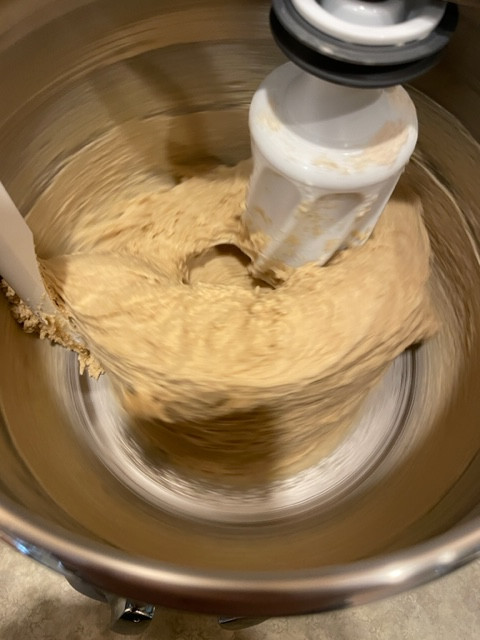 Adding just a bit more flour gave me more of the boule shaped mass that apparently I'm supposed to have: 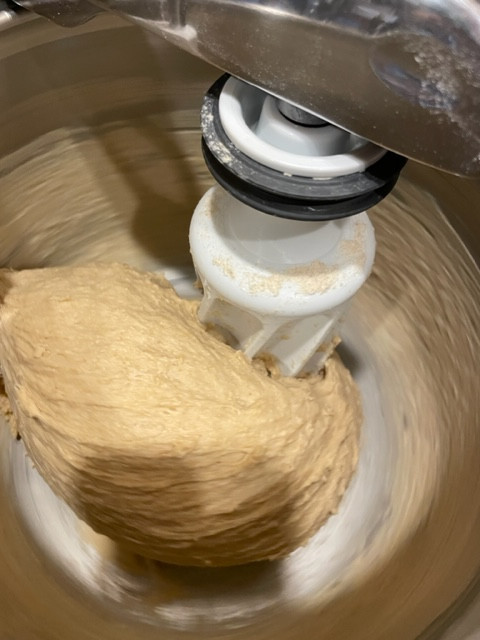 I kneaded that at 2:00 for 12 minutes and it was still not good. After a total of 20 minutes I had a good windowpane. I let it rest for about 10 minutes and did a stretch and fold, which gave me a great looking smooth boule (still a little wet though). I placed it in the proofing box for a little over an hour until roughly doubled in size. Then, divided, shaped, and into the pans to rise for another hour or so. Baked at 350F (tenting with foil after 15 minutes) until temp reached around 195F. Tops brushed with butter and cooled for an hour. 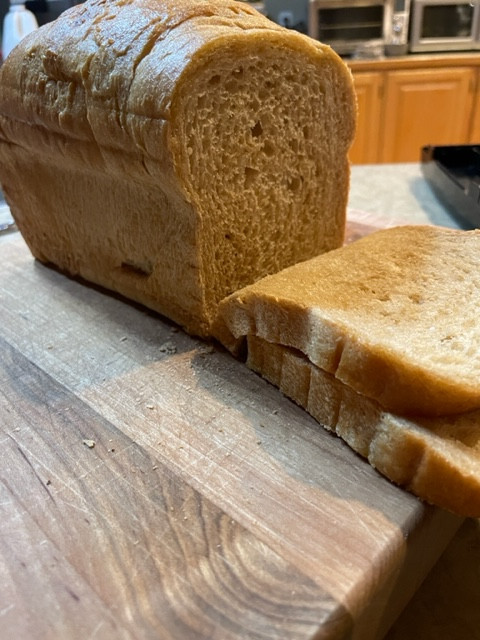 It came out wonderful. Soft tasty sandwich bread is what I'm after and achieved. I don't know that I'm completely sold on the machine yet. There's no denying the results, but is it worth the hefty price tag? We'll see. Now that I've figured out how to use it, I'm guessing it'll grow on me. BTW sjtill, I'm using the Palouse berries that I think you had recommended. I've not normally cared for whole wheat bread as I've never had any that didn't have a distinct flavor that I didn't care for. These taste great and not much different from a good white bread, just a little nuttier. ________________________________________________________ "Great danger lies in the notion that we can reason with evil." Doug Patton. | |||
|
goodheart |
Hi Gustofer, my wife and I love the taste of the whole wheat bread, so de gustabus non est disputandum. By the time I start the kneading, my dough is much thicker than yours. It's a well-defined boule, not sticky as yours appears. I am sure you shouldn't need to knead (there I go again) so much, but should have more flour in the dough. _________________________ “Remember, remember the fifth of November!" | |||
|
| Staring back from the abyss |
It was a tad higher hydration than I'm used to with a sandwich bread, but it turned out great. I'll experiment with it some more obviously, but I'm a bit hesitant to overshoot it like I have been. ________________________________________________________ "Great danger lies in the notion that we can reason with evil." Doug Patton. | |||
|
| Member |
Gustofer, My wife has been baking sourdough variations for me for a number of years, which I highly appreciate. She just upgraded to an Ankarsrum some months ago. She likes it, but the moisture/stickiness aspect does have a learning curve, as we have discovered. Below is a Sourdough Milk Bread that is good for your tummy and tasty for sandwiches and toast. 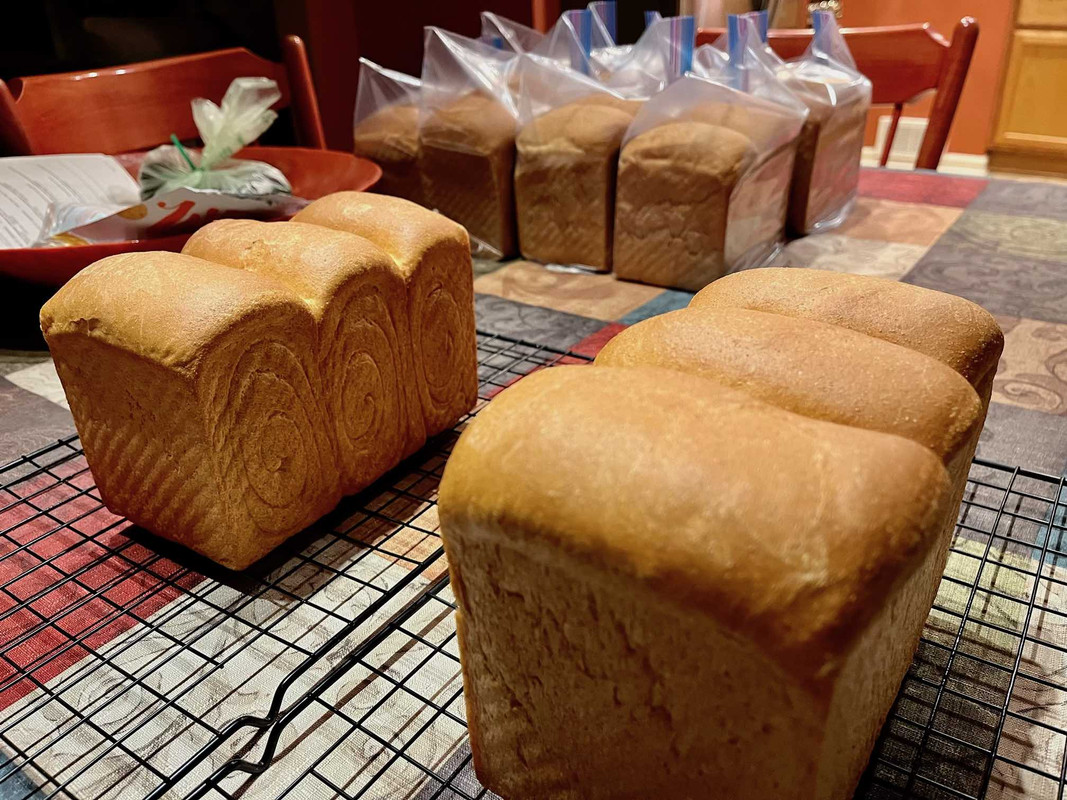 | |||
|
goodheart |
Glad to see another fan. They seem to be the best bread mixer for home use. Learning curve for sure though. With our Bosch, the rule was to add flour until the dough hook with dough "cleans the bowl". With the Ankersrum, my rule is to use 14 cups of flour to 5 cups of water. It's rare it doesn't turn out right. BTW: One reason I continue to bake the whole wheat bread--even though I'm currently on a low-carb diet--is that it really helps with the--digestion, shall we say. Without some fiber things get bad on a low-carb diet. _________________________ “Remember, remember the fifth of November!" | |||
|
Baroque Bloke |
^^^ For high fiber bread I don’t think you can beat Mestemacher Pumpernickel. There’s almost nothing in it but whole grain rye and water. Low calorie, and I like its flavor. It’s the only bread I keep on hand. Unlike the previous version of Mestemacher Pumpernickel, it toasts up crisply. I buy it at Whole Foods, but it’s also available on Amazon: https://a.co/d/03awr0HY Serious about crackers. | |||
|
| Staring back from the abyss |
That's some fine looking milk bread there Rinehart. I've got a recipe for that that I've been meaning to try. ________________________________________________________ "Great danger lies in the notion that we can reason with evil." Doug Patton. | |||
|
Member |
The Ank is light years better than a newer Kitchenaid for making dough. I have a Bosch Universal Plus and it worked well for dough but I never really liked the way in Kneaded, it just didn't do a great job. I wanted a spiral but didn't want to spend the money for one so I bought an Ank. It works great but as mentioned, there is a learning curve and my doughs tend to be stickier. They develop gluten slowly so it can take a good while to knead. A few months ago I dropped the money on a Famag spiral and absolutely love it. It's not inexpensive but I love making bread and pizza dough and do it enough to make it worthwhile. | |||
|
| Member |
Thank you kindly, Gustofer. I will pass that on to the missus. She is the brains. I just lift things. Here's a freeform Sourdough- 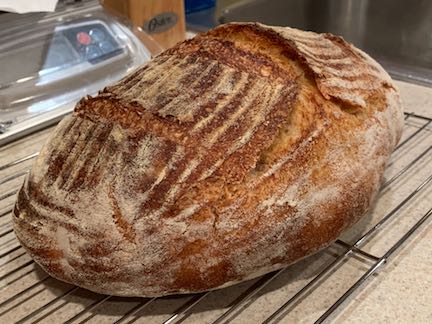 | |||
|
goodheart |
Here are photos of the batch of whole wheat bread I made today, following the steps I posted above. The total amount of flour was about 14 1/3 cups. Here is the "boule" after kneading  Here is the dough spread out on a cutting board, divided into six roughly equal portions. I add or subtract to make each loaf about 1.25 pounds (1 lb 4 oz).  Here is the dough folded together and crimped at the bottom; resembles a little fetus.  Dough in the pan before proofing  Separating yolk from egg white for the glaze; add 1 tbsp water.  Brushing on glaze  Sprinkling on sesame seeds  Six loaves in the oven; oven alarm probe in one; pan of warm water on bottom of oven  Oven alarm set for 200 degrees F  Loaves at end of rise just before turning oven to "bake"  Finished baking--oven alarm at 200 F  Lucky for me, turned out perfect--as usual!  _________________________ “Remember, remember the fifth of November!" | |||
|
Baroque Bloke |
Impressive! You’re going to freeze what you don’t eat right away? Serious about crackers. | |||
|
goodheart |
Yes, we'll freeze five loaves in gallon freezer Zip-Locs. 2 minutes in the microwave and smell, taste and texture as good as fresh from the oven. By the way, I've lived in Germany and I've lived in Russia. I've eaten plenty of pumpernickel and chorny xleb. The whole wheat is universally popular in the family. _________________________ “Remember, remember the fifth of November!" | |||
|
| Staring back from the abyss |
I think that part of my issue is smaller batches, allowing the dough ball to consolidate and just whip around the bowl and roller. It'll knead up great eventually, but not near as fast, or as well, as a larger amount of dough would like yours. Thanks for that pic, now I can see what it is supposed to do. Next time I'll make a double batch and see if that works better. ________________________________________________________ "Great danger lies in the notion that we can reason with evil." Doug Patton. | |||
|
| Powered by Social Strata | Page 1 2 |
| Please Wait. Your request is being processed... |
|
© SIGforum 2025